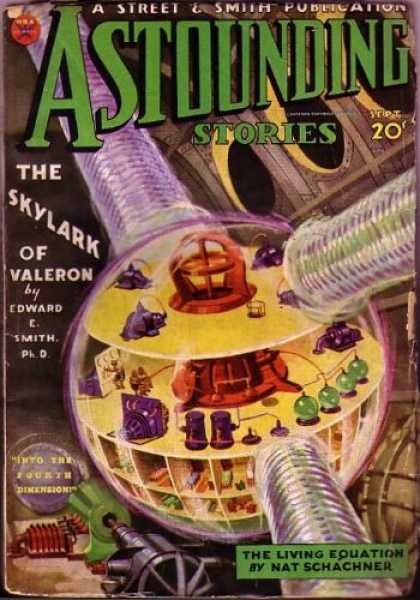|
LITR 4632: Literature of the Future |
Final Exam Essays 2013 Sample answers
for Essay 2:
|
 |
Katasha
DeRouen
The Struggle to Connect
In my initial midterm my opinion of the futuristic Sci-Fi
genre was skewed and narrow. I felt as though “My ability to comprehend and
remain abreast on futuristic readings is often prohibited by personal interest,
and level of believability. Admittedly, I am not fond of the Sci-Fi genre in its
entirety; however, I am extremely interested in certain aspects of the genre
that directly shape the evolution of our world. As a future educator, I find
particular interest in the progress of our present into the future. I do
consider the future as a book being written now, and further developed based on
society’s present choices” (DeRouen Midterm excerpt). Through personal fault, I
could not connect with many of the readings simply due to disinterest.
However, I decided to give futuristic literature another go,
without a preconceived feeling of incompatibility. Through this view, I was able
to draw a likeness to the writings and experiences of the poetic works of Emily
Dickinson, and the playwright William Shakespeare. Dickinson was typically a
dark writer, a style I favor. Her pieces came from a forbidden place—an intimate
space, her mind. The same is true in futuristic literature: the reader journeys
to a prohibited space, the future. For me Shakespeare operates within a
different dimension; he was an extremist, and the Sci-Fi genre functions within
a comparable intense element, the future. When reading both authors and pieces
from futuristic literature, the same welcomed eerie feeling is present.
Not only is the feeling a constant for me, but I noted many of
the same writing styles present within both genres, if you will. For example,
Dickinson’s use of the metaphor is similar to Thomas Fox Averill’s clever use of
the extended metaphor. In The Onion and I,
Averill describes his life among the onions as “quiet, sure. Rooted” (Virtually
Now 14). He further expounds on this same metaphor as he recants the process of
onion re-creation, “And the roots: none of the Cyberonions I’d seen had roots”
(Virtually Now 18). Hence, when referencing the remarkable attributes
encompassed within a passage that uses literary elements, I can agree with Paul
Acevedo as he expresses, “Extended metaphors, those which recur and run
throughout a piece of literature, turn the piece into a gourmet meal” as written
in his personal 2009 final exam submission “The Zesty Metaphors of
Hinterlands.” Dickinson uses the
metaphor as a negation tool. “It was not Night/ It was not Frost” (Dickinson
3-5), a line from her poem, “It Was Not Death, for I Stood,” typifies the above
notion as she does not tell what death is, but what it is not.
Upon the initial readings of various works by author William
Gibson, I found it extremely difficult to absorb and decipher many portions of
his texts. That is, until a fellow classmate suggested reading a particular
piece to a rhythm. I reread Burning
Chrome to a familiar Dickinson rhythm
and quickly observed myself comprehensively maneuvering through the passage.
Through her poetic creations, Dickinson adopted the meter for many of her poems
from hymns and ballads of her time, allowing rhythm to bridge the content with
the message. After reading in this manner, I was able to appreciate the manner
in which Gibson personified Chrome and contrasted her to the human Rikki.
My study of Shakespeare assisted me in embracing Gibson’s
The Gernsback Continuum. Parker,
through my interpretation, gains access to an alternate future, believing that
the unknown will certainly prove better or easier to exist within versus his
present state. He is tempted by the offerings of this
other world and begins to weigh the
differing visions obtainable within the continuum. He takes his chance with the
alternate, and quickly notes that something is different—or at least strange in
this world. Gibson injects the passage with mental breakdown and questions of
sanity. Sound familiar? The Shakespearean play
King
Lear sings the same song. In the
opening scene of the play the title character wishes to give up his kingship
because he thinks that it will be simpler to live without all the decision
making that accompanies the position, analogous to Parker assuming life will be
easier in the continuum. Lear decides to give up his kingship, but not his
additions (knights, servants- all the royalties of a King). With the forced
downsizing of his additions, he quickly realizes this “world” is different,
sharing a similar revelation with Parker. As in
The Gernsback Continuum, King Lear
also questions his sanity as he begins to see ghosts with an unsure mind.
Ironically, King Lear operates as a
totalitarian society, the very aspect of the continuum that tainted Parker’s
view of the alternate world. Comparing and contrasting the elements of both
Shakespeare’s and Gibson’s texts proved to provide me with a clearer
understanding of the very intricate class reading.
In writing this essay I am experiencing a bittersweet growth.
While I am excited to have been able to draw this connection amongst expressive
poets, talented playwrights, and envisioning authors, it saddens me to not have
reached this reasoning near the beginning of the course. However, I am confident
that my “Struggle to Connect” will allow me to relate to my future students, and
remember this experience when I reluctantly assign them a required textual
reading that they have no interest in exploring.
http://academic.brooklyn.cuny.edu/english/melani/cs6/notdeath.html
The Norton Shakespeare. Eds. Stephen Greenblatt, et al.
